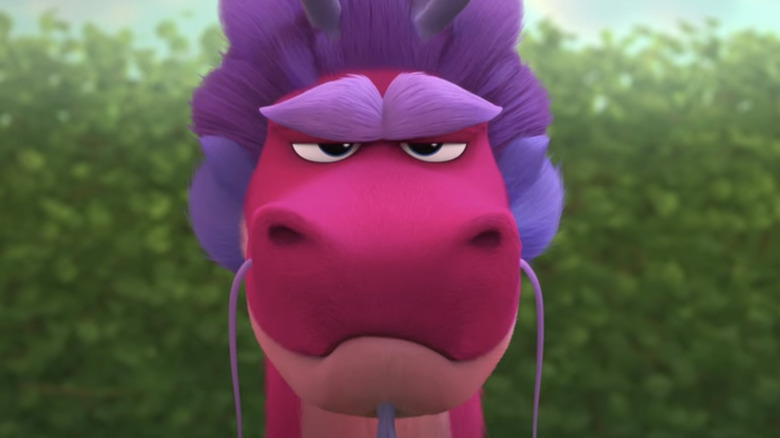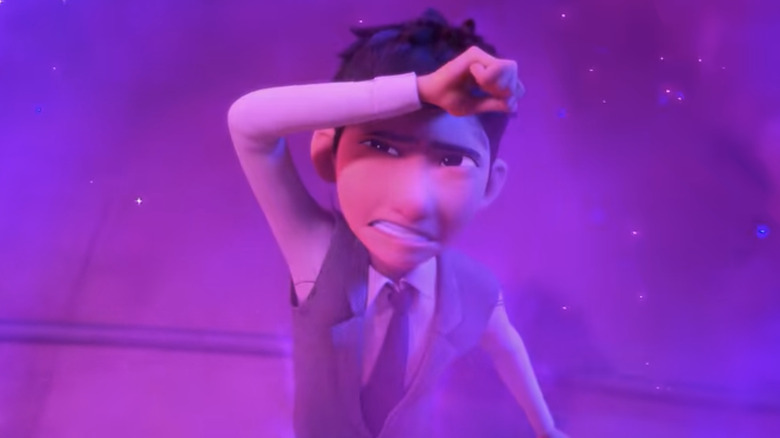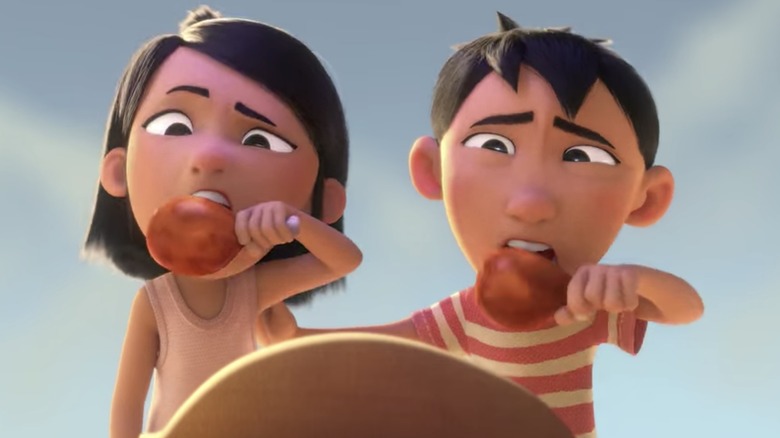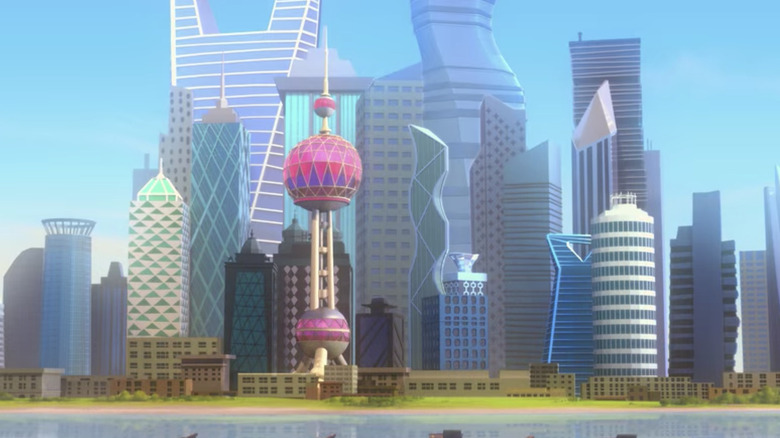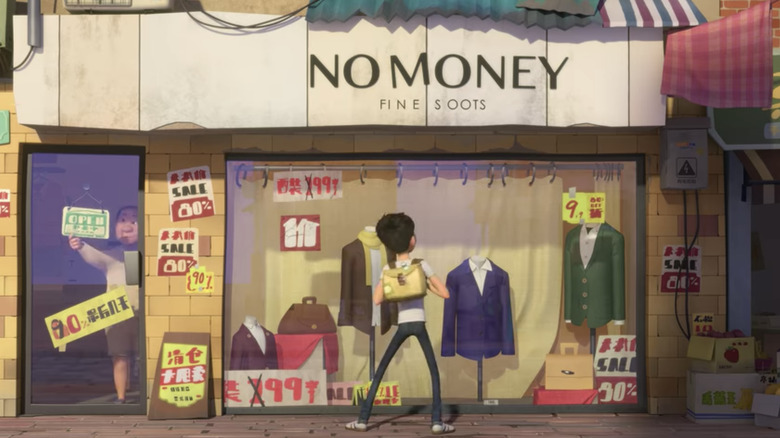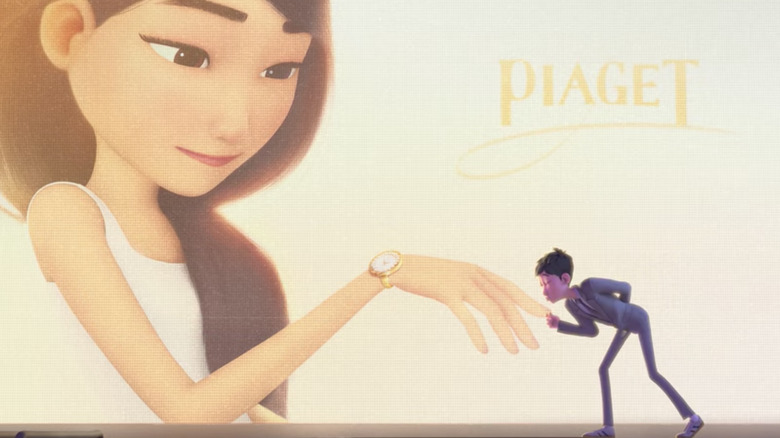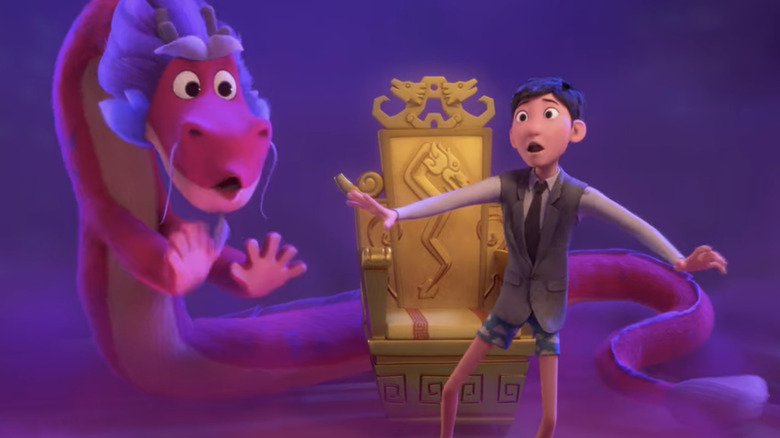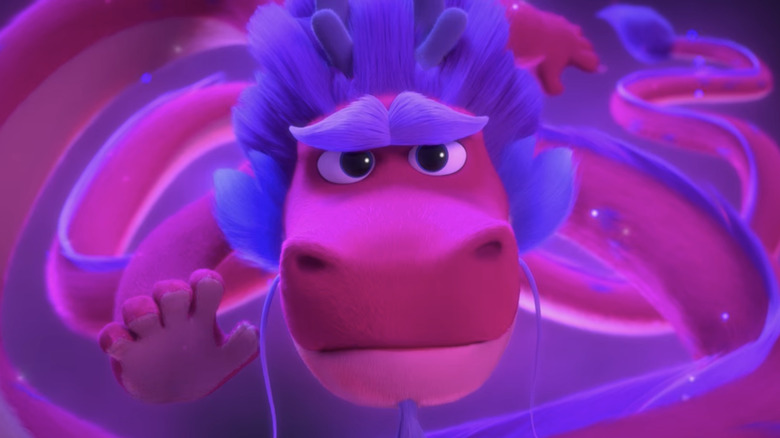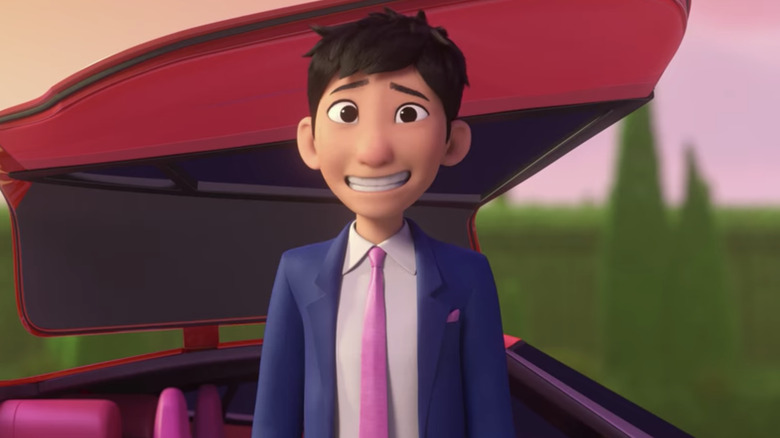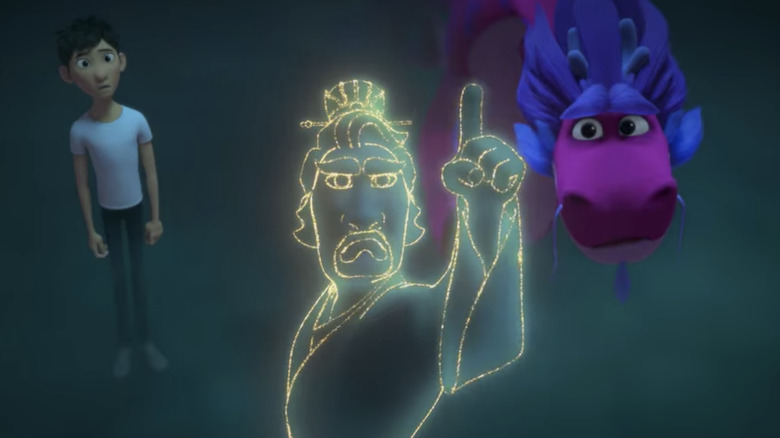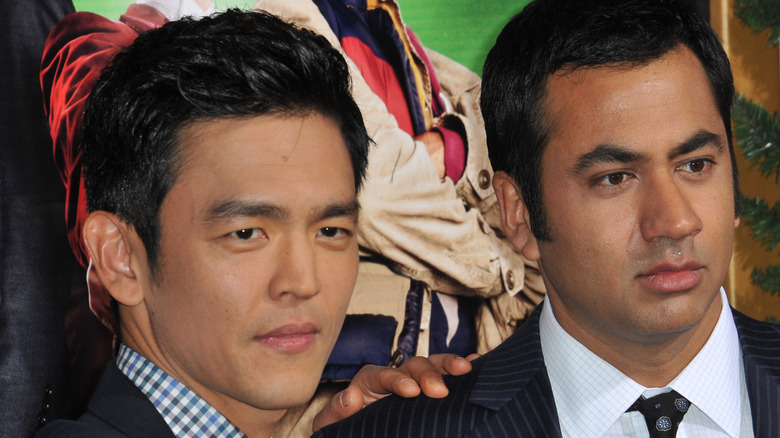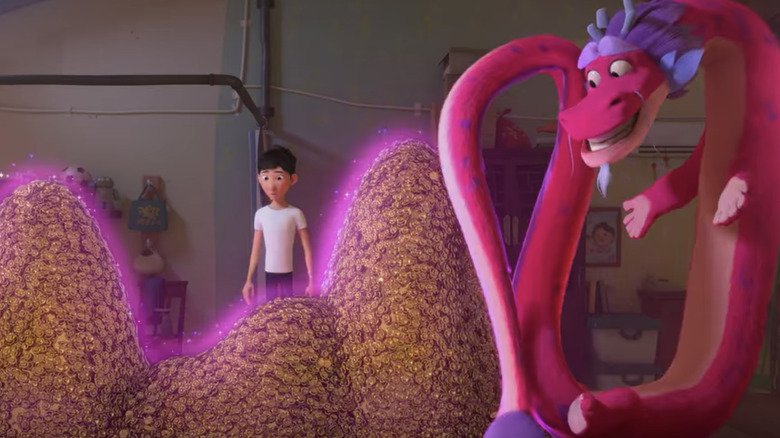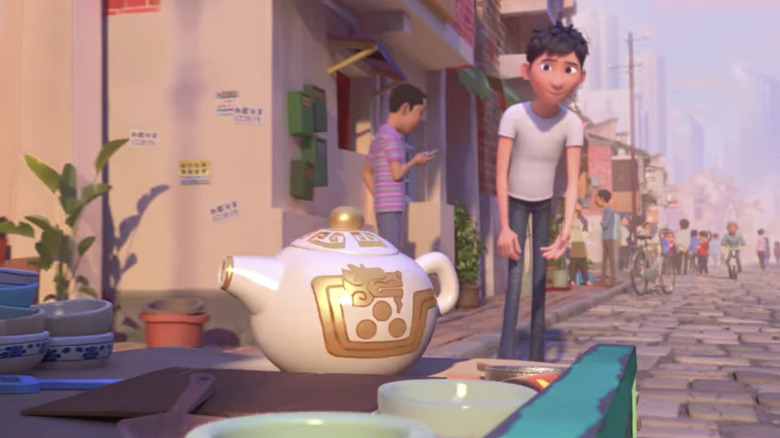Things Only Adults Notice In Wish Dragon
The classic tale of a magical entity who grants three wishes gets drenched in pink in 2021's "Wish Dragon". If you've been wishing for a more soft, cuddly sort of genie in your family films, then your wish has been granted — and he's a big fan of shrimp chips to boot. Our story stars an unassuming young man named Din (Jimmy Wong), a college student trying to make ends meet. As if that wasn't enough, he's also trying to protect his magical teapot, which houses a powerful dragon named Long (John Cho).
Long, who is on his own unique journey of redemption, offers Din three wishes. Din has only one thing on his mind: He wants to be reunited with his childhood friend, Li Na (Natasha Liu Bordizzo). What results is a story full of magic, whimsy, and adventure. Though the entire family can enjoy "Wish Dragon," the movie is also chock-full of cheeky humor, sly references, and surprising depth. These are the things only adults notice in "Wish Dragon."
Wish Dragon meets Agrabah
Adult viewers can't help but find "Wish Dragon" somewhat familiar. It's like something from a distant memory, or a childhood dream — you know you've seen it somewhere, but you're not quite sure of the specifics. Your mind is not playing tricks on you. Back in the early '90s, Disney released a movie featuring a goofy blue sidekick with "unlimited cosmic power." We are talking, of course, about "Aladdin" and the iconic Genie, voiced by the late Robin Williams.
The foundations of "Wish Dragon" are indeed reminiscent of the iconic animated feature set in Agrabah. Luckily, these similarities are minimal. Aside from the basic story of a poor schlub getting three wishes and using them to impress a girl, "Wish Dragon" tells a tale all its own. Long is also a far cry from Williams' cheerful blue wish-granter — he's more reminiscent of a nihilistic hipster than anything else. While there are enough differences between "Wish Dragon" and "Aladdin" to keep things on the up-and-up, that won't stop us from digging through our old VHS tapes once the credits roll.
Din and Lin Na eat their pet chicken
Perhaps we've become jaded in our later years, but as the movie's cheerful montage of childhood joy rolls on, we're just waiting for the other shoe to drop. And indeed, a dark and sinister subplot is woven through these wonder years. Will a kid pick up on it? No. But an adult definitely will.
Amidst the stream of happy memories, we see the young duo sitting over a grave marked with the name of their beloved chicken, Clucky. It's a tough childhood lesson, and we feel their pain ... until the kiddos each raise a drumstick into frame and take a bite through their tears. Little ones will likely giggle at the two eating through their sadness, completely unaware of the implications of the joke. But an adult can't help but be horrified. Clucky was a trusted companion, but that relationship is apparently second to the kids' insatiable appetite. Dark stuff, Din and Li Na. Dark stuff.
An entire metropolis pops up in a single decade
Skyscrapers are an essential part of any city skyline. These monuments to human achievement take thousands upon thousands of man hours and an obscene amount of materials to construct. This is nothing a 10-second montage can't handle, though. When Li Na moves away, young Din is left standing alone in the rain, flashing his best puppy dog eyes and clutching a soggy kite. The sadness is interrupted by a dazzling display of just how efficient humans in the world of "Wish Dragon" have become.
10 years pass after Li Na departs. In that time, an entire city pops up in an empty field. Call us cynical, but we have a hard time believing a whole metropolis would be constructed in a single decade. If you've spent eight hours assembling a dresser from IKEA, you know what we're talking about. Okay, maybe we aren't the best judge of construction timelines, but it's simply implausible for such a massive city to go up in just 10 years. One skyscraper takes years to discuss, plan, and build, yet there are numerous ones popping up here, in the middle of nowhere. We're surprised Din's home even survives the gentrification process.
The joke hidden in the stores' names
After a hearty dose of childhood wonder, our hapless hero flies into frame as a grown man on a moped, navigating the hectic city of Shanghai. Well, not entirely grown: He still lives under his mom's thumb and possesses a naivete inherent to the young. It's clear Din has yet to experience the realities of the world. He gets a crash course on the topic when he sets out to buy himself a suit, though. This is clearly a new experience for Din, because he darts over to a swanky tailor selling top-tier garments, completely unaware of just how much the universal costume of the elite truly costs.
The names of each clothing store he visits will send adults into hysterics. The first, ritzier establishment goes by the name "Nomani." A snooty employee ushers Din out the door and tells him to "be realistic." Din then scoots over to a more disheveled store by the name of "NoMoney," which advertises "fine soots." It's a comparison that will make any adult in the room giggle. But the amusement is dampened when poor Din's suit begins falling apart shortly after he purchases it — though that is a pretty accurate development.
Din gives off some stalker-y vibes
We don't want to say we enjoy seeing Din experience the disheartening realities of life, but it is something a majority of adults can relate to. Any knowing smirks on adult faces are quickly replaced with suspicious squints when we learn just what Din has planned for his evening, however. "Wish Dragon" would have you believe Din has maintained his friendship with Li Na all the way up until it's revealed that his date plans are with a large, glowing billboard.
Rather than lurking on social media like a normal person, Din has elevated his desire for companionship to a whole new level of delusion. The billboard he is on a date with features a giant picture of his childhood friend. Longing for a happier time is all well and good, but this scene gives off slightly stalker-y vibes. Din is a pure soul chosen by the gods, of course, so we know he's an okay dude. But if you were to take this scene out of context, it would take on an entirely different and far creepier meaning.
Din accepts death weirdly easily
We like to think that when we face our death, we'll stare down the Grim Reaper and tell him to do his worst. It's completely likely, however, that we'll be scared out of our minds. If the hero in "Wish Dragon" possesses any fear of death, however, he doesn't let it show. In fact, in a fleeting moment of humor, Din shows us he's ready to face whatever may come his way in this world or the next.
When Din first meets Long, it's in dramatic fashion: The magical teapot whistles loudly and a glittery plume of purple smoke unfurls across the rooftop, revealing a gigantic pink dragon who proceeds to give a grand speech about how great he is. Din immediately assumes he has died. Rather than experience a single stage of grief, he shouts, "Grandma! It's Din! I fell off the roof! Where is the light? I'm coming!" Even with so much life left to live, Din isn't the least bit shaken by his sudden demise. Kids will laugh, but to a grown-up, the implications are troubling. Fearlessness is a quality expected of any movie hero, but Din is still human — the ease with which he accepts his death makes you wonder how much he loves his life. It is sweet how his first thought is about his Grandma, though. Oh Din, you innocent, lovable goof.
Long can raise the dead
When a character finds a magical container housing a wish-granting being, there are always some rules involved. No making anyone fall in love and no killing are the big ones. In "Wish Dragon," Long also states that he can't do time travel. There is one thing omitted from his list of rules that usually comes standard, however: Long can raise the dead.
Long may be the most powerful genie-type character we've seen in fiction, in fact. After a noble self-sacrifice, Long successfully serves the entirety of his afterlife punishment, and is shown to a parade in the heavens. Instead of basking in glory, he stares down his creator and basically states, "Please sir, I want some more!" Long returns to Earth and grants Din one more wish — and boy, is it a doozy. Din wishes for Li Na's father, who fell to his death in the final confrontation, to be resurrected. The fact that Long carries this out pretty much makes him the Wish-Granter Supreme.
Din is a tragically bad wisher
The most frustrating part of watching a movie featuring a wish-granting entity is watching the protagonist grapple with what they want most. We'd all love to believe that money isn't everything, but in reality, having a lot of it is a big leg up in the pursuit of happiness. Having a healthy body is high on the list of importance as well. Din wants nothing to do with either of these things though. The power of friendship reigns supreme! Sure, adults and kids will both get a kick out of Din's accidental wish for fighting prowess. But once we move on to his second wish, the audience becomes split between delighted kids and frustrated adults, because Din may be the worst wisher in history.
Din's first wish mishap is unfortunate, but we get it. He wished for fighting abilities in the middle of a panicked escape from evil henchmen. It could happen to any of us. The second wish, however, is unforgivable. Din wishes to be a rich princeling ... for 24 hours. There is absolutely no reason to put in the time stipulation! Even Long is taken aback by the request. It may be a statement about the purity of our protagonist, but that doesn't make it any less difficult to watch. It's like wishing for a free burger from McDonald's, no combo.
Long shows more growth than any of the main characters
Heroes are expected to grow during our time with them. They learn valuable lessons and evolve as people through a series of extraordinary circumstances. Din and Li Na are definitely placed front and center in "Wish Dragon," but it isn't these two who undergo the most character growth in the film. For the most part, Din remains a bright-eyed idealist and Li Na gets the human connection she seeks. It is the film's supposed sidekick, Long, who achieves a drastic amount of change.
Long first appears as a cynical being. His past life as a disgustingly rich emperor still consumes his identity: Long views those around him as peasants, and conceives of his spiritual punishment as something to be endured until he can ascend to glory. By the end of "Wish Dragon," however, Long is a far more selfless being who has learned what it means to truly care about another person. Kids don't appreciate Long's growth as much as adults do, who know a thing or two about sacrifice.
Harold Lee grants wishes
"Wish Dragon" is highly distinguished by John Cho's performance as Long. You may recognize Cho from his role as Hikaru Sulu in the modern "Star Trek" movies, or perhaps his starring role on the short-lived but highly lauded ABC series "Selfie." But those of us with a few years under our belts likely know him from the cult classic "Harold & Kumar Go To White Castle." The 2004 stoner flick is a classic of the genre, and adds an extra layer of humor to Cho voicing Long.
As Harold, an uptight cannabis enthusiast, Cho is utterly hilarious. The film was such an unexpected hit that it spawned multiple sequels, one of which is even 3D. Though Cho has made a plethora of fantastic movies and TV since, many adults just can't help but visualize Harold as Long goes on one of his cynical rants. This isn't distracting, however — it just brings an extra (and very grown-up) helping of joy to "Wish Dragon."
In the end, money is paramount
Dragons are renowned for coveting treasure. Shiny gems, gold coins, and glittering trinkets are the building blocks of an optimal dragon's nest. Long may have been human at one point, but his lust for riches is on par with Smaug. From the first moment we meet him, Long believes that money can solve all problems. This isn't the lesson most people want from a PG-rated movie, though. No, we want such a film to nurture the soul and make sure young viewers learn what truly matters in life. By the end of "Wish Dragon," we're shown that the most important thing in life is ... money. Yep, still money.
The final moments of "Wish Dragon" feature Din, Li Na, and family putting the finishing touches on a new restaurant. First off, we can't completely accept that as a happy ending, given the fact that there was the option of none of them ever having to work again. Our cynical adult brains can't help but view all the responsibility lying behind that cheerful façade. But beyond that, in the end, the characters find happiness by monetizing what they love to do. That still tells us that money can buy happiness! It just adds a few steps!
Din could have given wishes to any of his loved ones
Hello, fellow adult! Are you also annoyed Din doesn't consider handing the magical teapot over to his loved ones so they might see the realization of their dreams? While Din rummages through a supply closet in the new family restaurant, he stumbles across Long's new teapot. The genie bargained with the gods to serve another 10 masters in exchange for being sent back to help Din. This is an exciting development: Usually, once three wishes have been granted, the genie and his lamp are whisked away to who-knows-where. Our first thought is that he'll give a loved one the same magical experience he just enjoyed. But that underestimates how self-righteously dimwitted Din truly is.
After a heartwarming farewell, Din takes the teapot and places it on a random cart as it passes by. There must be diminishing returns on selflessness, because in this moment, he loops back around to being simply selfish. All of Din's loved ones are inside, stressing about their new business endeavor. Meanwhile, Din is tossing aside the option of having their wishes granted because he feels like he has everything he needs in life. If being selfless means doing what Din does, which is equivalent to placing a winning lottery ticket in a bottle and floating it out to sea rather than giving it to one's overworked mom, then we don't want anything to do with nobility.
